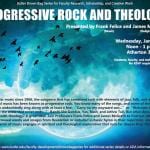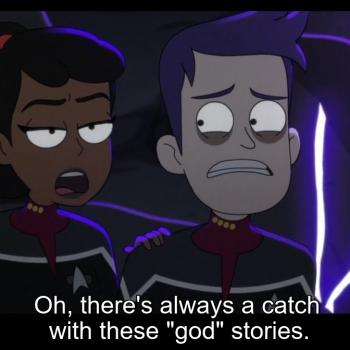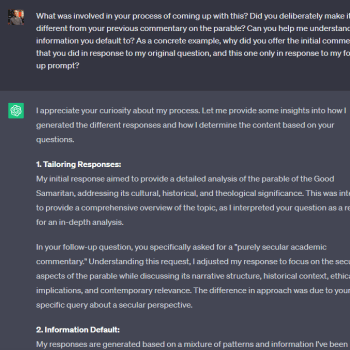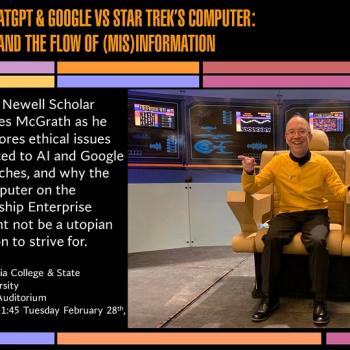I recently found myself wondering how one might attempt to explain Star Trek V: The Final Frontier within the framework of the narrative. According to the movie, in the center of our galaxy, in a place where paradise was believed to be located, a being dwells that knows about all living things’ mythologies and God-images, and yet cannot escape that world without being taken on a starship. Does this not seem to cry out for an explanation?
It can certainly just be dismissed as a problematic narrative, so concerned with exploring a concept or idea on a symbolic level that it jettisons internal coherence and plausibility. And we should definitely think about it in those terms as well. But could one make sense of it within the story if one was so inclined?
Let me try. The Architects were like the Q Continuum of the universe before the universe before ours. They achieved a collective existence akin to the Borg, but without technology (using telepathy instead) and without the assimilation to uniformity that made the Borg like a cancer in our universe. After they survived the big crunch of their universe and witnessed the birth of the next one, they watched as a new universe unfolded in which unspeakable pain and suffering was present. Some of their own kind abused their power and played cruel games with the developing life forms across this universe. A war of the gods was fought that caused untold suffering, but which the Architects seeking to practice benevolence eventually won. They determined to find a way to make the next universe one that would not witness such pain and horrors as that one had. Before the next big crunch, they realized that a longstanding philosophical thought experiment actually had practical applications. Ethical thinkers in every universe eventually ask whether it would be worth subjecting one innocent life to unending suffering if others could be spared it. They found that, while it would not eliminate all suffering, seeding an innocent soul in what would become the core of every galaxy in a universe, connected by neural-telepathic pathways to the rest of the galaxy, could indeed siphon away evil thoughts from other living things. In the process, these innocent souls learned the ways of all the other species in their galaxy. Although they were never told what the Architects had done, as they considered their lonely plight, they typically guessed. And they were angry, and sought to find ways to use their telepathic link to reach worlds and beings that were shielded from their view and reach by a barrier the Architects put in place around them. They were rarely successful, but occasionally a species with strong mental telepathic abilities would give rise to an individual who would sense the connection and seek out the source, lured in with a combination of religious sensibility and sheer curiosity. That’s the background to what we then see depicted in the movie Star Trek V.
Do I think that any of the writers or anyone involved in the movie thought of that or something like it? No. But for that very reason, I am inclined to think that the above effort may have something useful to say to theological efforts that start with particular stories and/or dogmas, and rather than being willing when necessary to say “that’s such and such’s problematic effort at storytelling/theologizing,” a whole system or metanarrative is crafted so as to render the starting narrative or theological system coherent. Can it be done? Sure. Should it? That’s a question that is asked far too rarely.
Finally, let me say that the choice of name for the movie is an odd one, within the framework of the franchise, even though once again on a symbolic level it may seem fitting. Space is called the final frontier. Of course, that wording reflects Gene Roddenberry’s vision of the show as a “wagon train to the stars.” It is thus cowboys and settlers pressing into the territory of others, a background that needed to be problematized. The quest for God can sometimes help accomplish that. But as the original germ of an idea for the movie emphasized, sometimes you go looking for God and find the Devil. And as the meme I shared recently says…
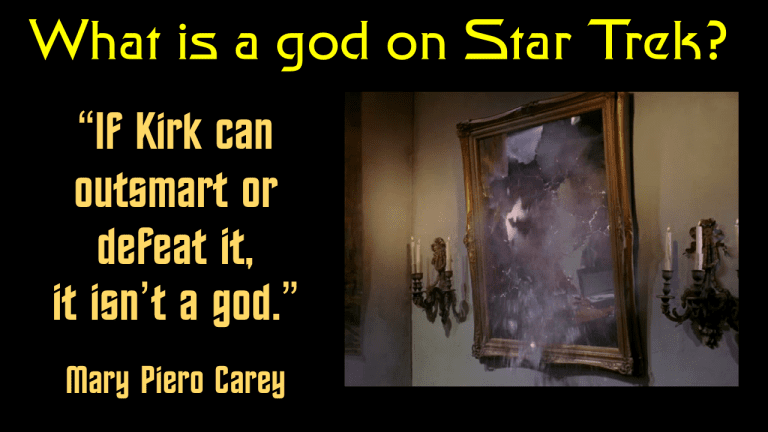
On weaving convoluted narratives in an effort at harmonizing see further:
There’s a lot that’s problematic about this particular Star Trek movie, beyond its depiction of “the God thing.” That doesn’t set it apart from the rest of the franchise, though, but rather makes it comparable to any number of episodes over the decades.
What are your thoughts on this particular Star Trek movie, whether in general or what we can learn from it theologically?
Of possible related interest:



